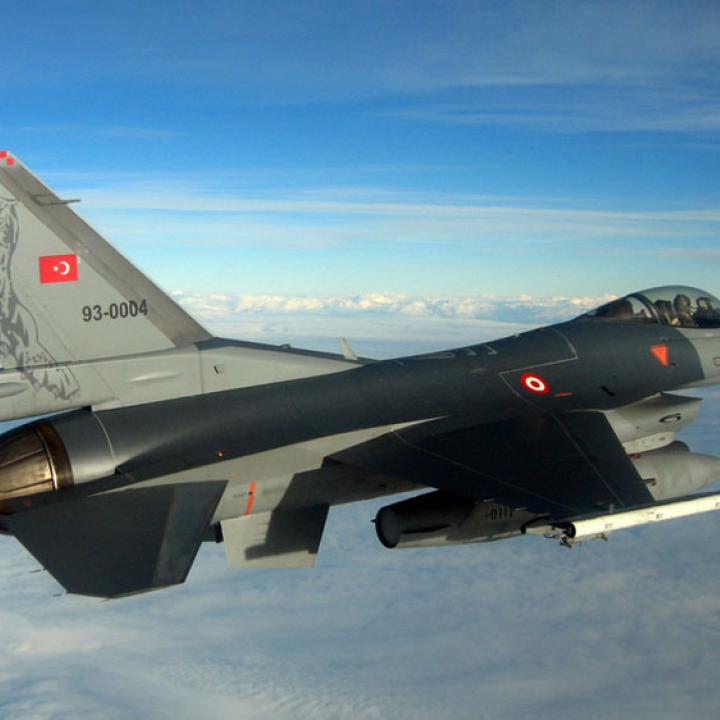
- Policy Analysis
- Policy Alert
Turkey Calls for Safe Havens and No-Fly Zones in Syria: Five Things You Need to Know

Ankara's security and political concerns may drive it to establish buffer zones unilaterally, while Washington's hesitance could cost it a coalition.
Since the armed phase of the rebellion against Bashar al-Assad began in summer 2011, Turkey has been intent on setting up safe havens and accompanying no-fly zones in northern Syria to protect areas held by the opposition. Here are five things you need to know about Ankara's plans and motivations:
1. Turkey's main reason for creating a buffer zone is to shield itself from instability in Syria. It has also raised the issue again because Assad's forces have recently made advances in the north at the rebels' expense, including around the country's largest city, Aleppo. Ankara hopes to set up safe havens that would be protected by the Turkish military, as well as overlapping no-fly zones enforced by Turkish, NATO, and Arab air forces. It believes that that without these measures, the Assad regime may soon squeeze out the rebels.
2. Short of no-fly zones -- a difficult military undertaking that would require cooperation from the United States and other NATO members -- Ankara is intent on setting up safe havens in Syria as a means of managing the refugee crisis. Currently, Turkey hosts around 1.5 million displaced Syrians, many of whom will not return to their country in the short- to midterm while it remains war torn. A Syrian safe haven would act as Turkey's buffer zone against further refugee flows.
3. A more long-term concern for Ankara is potential radicalization associated with refugee populations. Similar to the Afghans who fled their country's wars in the 1970s and '80s and wound up staying in Pakistan for decades, many Syrian refugees will no doubt stay in Turkey. And just as Afghan refugees were a conduit for radicalization inside Pakistan, some of the current refugees in Turkey could import Syria's problems, including networks linked to the Islamic State of Iraq and al-Sham (ISIS), sectarian violence, and jihadist ideology. Ankara believes that safe havens in northern Syria would help address this risk by spurring the gradual transfer of refugees back to their country.
4. Whether it does so multilaterally or unilaterally, Turkey aims to establish the havens in slivers of Syrian territory across the border, concentrating on crossing points where most refugees congregate, and on areas held by the Kurdistan Workers Party (PKK) and its Syrian branch, the Democratic Union Party (PYD). Turkey appears to have the military capacity to protect any small-scale, unilaterally declared havens. It has already deployed artillery along the border, and these units could defend a narrow area stretching up to twenty-five miles inside Syria, depending on terrain. Ankara would also rely on its allies in Syria, including the rebel group Ahrar al-Sham, to help protect the perimeter of such havens.
In contrast, the Syrian Kurds could help or complicate Ankara's efforts depending on how events unfold. Turkey fought the PKK for nearly four decades and recently entered formal peace talks with the organization, so their relationship remains delicate. For its part, the PYD took over Kurdish areas of northern Syria in July 2012 and declared them to be autonomous cantons. Today, Turkish-protected safe havens could encompass these Kurdish cantons and help defend them against ISIS. Yet the PKK/PYD will vehemently oppose such an arrangement because it would establish effective Turkish military control over their activities in Syria. Of course, ISIS is currently assaulting one of these cantons, Kobane -- if the group prevails there and attacks the other two enclaves, the PKK/PYD might be forced to pick Turkish safe havens as a last resort. At the same time, if Ankara allows Kobane to fall, many Kurds living in the prospective havens will harbor long-term resentment against Turkey even if they agree to accept its protection against ISIS in the short term.
5. Much to Ankara's chagrin, the White House has consistently shot down calls for no-fly or buffer zones in Syria immediately after senior U.S. officials (including Defense Secretary Chuck Hagel, Secretary of State John Kerry, and Joint Chiefs Chairman Martin Dempsey) confirmed they were under consideration. This is a subset of a much broader concern among Washington's regional and European allies: namely, that airstrikes against ISIS are being conducted without any strategy to benefit the moderate Syrian opposition, whom the United States and other countries have committed to train and equip. Allies worry that Washington's "minimalist" approach is a recipe for partitioning Syria and legitimizing Assad's control over at least part of it, perpetuating conflict in and around the country for years to come. Such concerns could even dissolve the nascent anti-ISIS coalition, increasing the likelihood that U.S. boots on the ground would be required to destroy ISIS.
Soner Cagaptay is the Beyer Family Fellow and director of the Turkish Research Program at The Washington Institute, and author of The Rise of Turkey: The Twenty First-Century's First Muslim Power (Potomac Books). Andrew Tabler is a senior fellow at the Institute and author of In the Lion's Den: An Eyewitness Account of Washington's Battle with Syria.


